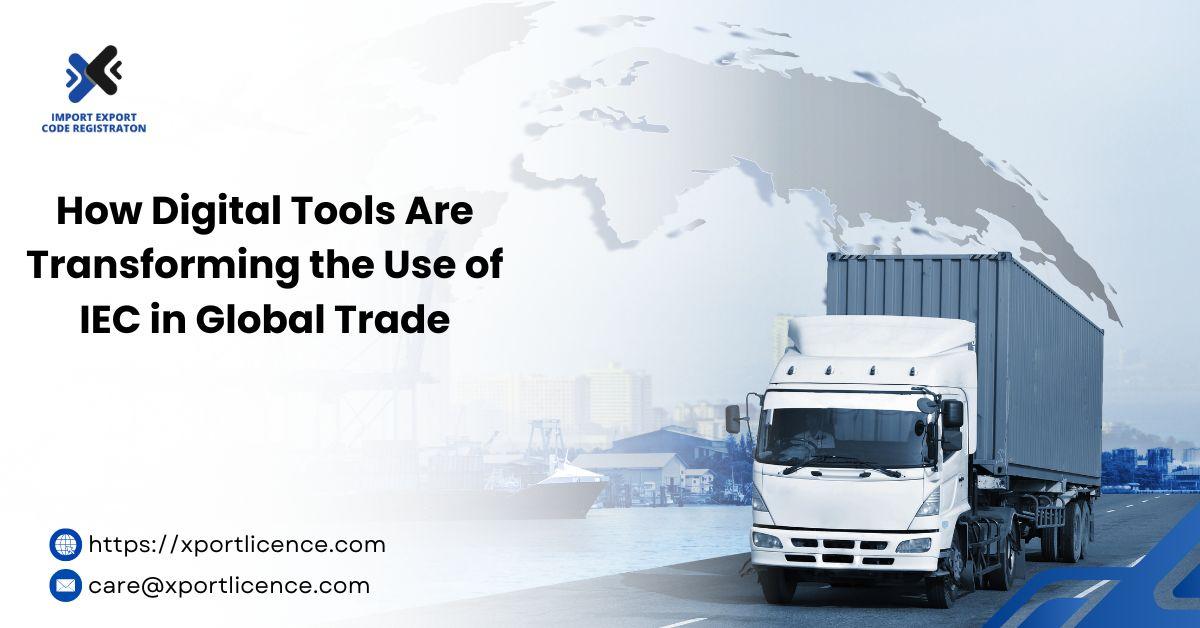Notifications

9 minutes, 4 seconds
-90 Views 0 Comments 0 Likes 0 Reviews

In today's interconnected world, international trade is a vital engine of economic growth. Businesses, from multinational corporations to small and medium enterprises (SMEs), engage in cross-border transactions to expand their markets, diversify resources, and enhance their competitiveness. Central to this process is the Importer Exporter Code (IEC) — a ten-digit number issued by the Directorate General of Foreign Trade (DGFT), Ministry of Commerce and Industry, Government of India.
The IEC code is the passport for Indian businesses entering the international trade arena. Meanwhile, the global trade landscape is undergoing a revolutionary change driven by digital transformation. From digital documentation and e-invoicing to blockchain and artificial intelligence, digital tools are not only reshaping how trade is conducted but also redefining the role of the IEC in this new environment.
This article explores the significance of the IEC code, the role it plays in international trade, and how digital transformation is amplifying its importance, streamlining operations, and fostering global trade integration.
The Importer Exporter Code (IEC) is a unique 10-digit identification number issued by the DGFT to any person or business in India looking to engage in international trade. It is a mandatory requirement for businesses or individuals who want to import or export goods and services across Indian borders.
Mandatory for Import and Export: No business can legally import or export goods without obtaining an IEC.
Lifelong Validity: Once issued, the IEC remains valid for the lifetime of the entity and does not require renewal.
Single Code for All Branches: One IEC is sufficient for all branches or divisions of the entity across India.
Digital Application Process: Applications for IEC are submitted online via the DGFT portal using Aadhaar-based e-verification or DSC (Digital Signature Certificate).
IEC is required for:
Exporters and importers of goods
Service exporters receiving foreign remittance
E-commerce platforms involved in international trade
Shipping and logistics companies handling cross-border goods
Enables access to global markets
Facilitates customs clearance and foreign remittance
Required to avail of export incentives under Foreign Trade Policy
Enhances business credibility and transparency
Digital transformation in trade refers to the integration of digital technologies into all aspects of the import-export process. This includes the use of:
Artificial Intelligence (AI)
Blockchain
Internet of Things (IoT)
Cloud computing
Robotic Process Automation (RPA)
E-invoicing and digital customs procedures
Need for Efficiency: Speeding up document processing and shipment tracking
Global Competition: Necessitating faster and more cost-effective services
Pandemic-Driven Change: Accelerated the shift to digital models during COVID-19
Policy Support: Governments and trade bodies promoting e-governance
Reduced Paperwork: Digital documents replace physical copies
Faster Transactions: Automation reduces delays at customs and ports
Increased Transparency: Blockchain and digital ledgers reduce fraud
Cost Efficiency: Reduces administrative and logistical expenses
Enhanced Compliance: Real-time tracking of shipments and trade documentation
Blockchain offers decentralized, tamper-proof records of transactions — a boon for international trade plagued by fraud and inefficiency. Integration of IECs into blockchain systems can:
Authenticate exporters/importers
Enable trusted digital trade identities
Automate compliance checks
AI tools can cross-reference IECs against global trade sanctions lists, identify suspicious trading patterns, and ensure that exporters are complying with international trade norms. This reduces risk and enhances trade security.
Digital Signature Certificates (DSC) are mandatory for businesses registering IECs or filing amendments. With DSCs now stored on USB tokens or cloud-based platforms, businesses can:
Submit secure applications
Sign export documentation digitally
Enhance the legal validity of trade documents
IEC data is now accessible via APIs for integration with ERP systems and logistics platforms. This allows:
Real-time IEC validation
Automated shipping and customs documentation
Streamlined trade workflows
With IEC data stored and transmitted online, businesses must protect against:
Data breaches
Phishing scams using fake IEC numbers
Identity theft
Many small exporters in rural areas still lack:
Reliable internet
Awareness of digital processes
Access to digital signature tools
Frequent regulatory updates, technical glitches in portals, and a lack of real-time support can hinder smooth IEC operations. Better support and awareness programs are needed.
Shortly, IEC holders could be assigned AI-generated risk scores based on their trade history, aiding customs authorities in faster clearances or red-flagging suspicious behavior.
India could collaborate with global trade bodies to develop interoperable digital trade identities where IEC numbers can be verified by foreign customs agencies and partners in real time.
With the rise of mobile business apps, IEC management — from application to compliance tracking — could shift entirely to mobile platforms, enhancing accessibility for rural and micro-entrepreneurs.
Visit the IEC Portal – Open the official IEC registration website on your browser.
Fill in the Application Form – Enter your business name, type, PAN number, and other required details carefully.
Submit the Application – Review all the details to ensure accuracy before submitting the form.
Pay the Registration Fee – Make the payment online using net banking, credit/debit card, or UPI.
OTP Verification – Enter the OTP sent to your registered mobile number or email for authentication.
Processing & Approval – The concerned authority will verify your details and process the application.
Receive Your IEC Code – Once approved, the IEC code will be sent to your registered email within 1-2 business days.
Note:- Now you can easily update and renew the iec code online
The Importer Exporter Code (IEC) stands at the crossroads of traditional trade practices and the digitally empowered future. It continues to serve as a foundational identifier in India’s global trade infrastructure. However, the impact of digital transformation is rapidly redefining its role, making it smarter, more accessible, and deeply integrated into automated, paperless, and real-time trade ecosystems.
As technologies evolve and policies adapt, IEC will likely become more than just a registration number. It will represent a digital identity — an anchor in a seamless, transparent, and secure global trade network. For businesses, embracing this transformation is no longer a choice but a necessity to compete and thrive in the international marketplace.

